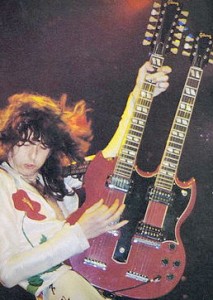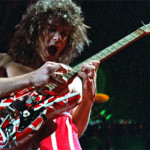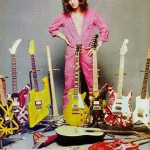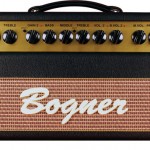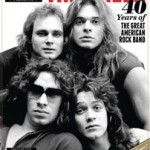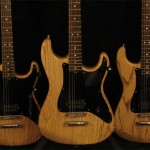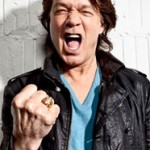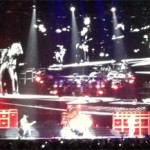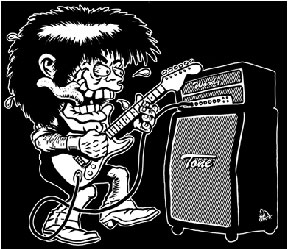Black F-ing Dog! Jimmy Used…No Amp
F the iPod, my brothers. Nothing sounds as good as blasting tunes out of speakers, particularly in the car. I don’t know what it is – the enclosed space, the audio engineering, the proliferation of high-end audio stuff in vehicles…. Don’t know and don’t care. The bottom line for me is that when I crank tunes in the car, it’s frickin’ awesome.
For the last couple of weeks my favorite has been the one and only “Black Dog” of the Zeppelonius bros. It is the bone-crushing sound of rock and roll. Tone everywhere. Wood! The guitar riff is amazing, the singing riff is cool, the bass part very cool (listen to it!) and the drums – forget it. Immense, powerful. We might even say, “pachydermic.”
Don’t know why recordings these days don’t sound nearly that huge, or why everyone isn’t trying to make them sound that huge. Maybe we need to put the English back in charge of rock.
Anyhow, do yourself a favor and crank the Blackest of Dogs in your bestest of wheels. And while you’re listening, bear in mind that the maestro, Jimmy Page – who as everyone “knows” went from using small Supro amps in the studio to Marshall Super Leads – apparently did not use an amp on “Black Dog.”
No amp.
Seriously.
Check this out, from a May ’02 interview of Led Zep IV producer Andy Johns by the Universal Audio webzine. Here’s the applicable part:
Andy: Would you like the “Black Dog†guitar tone story?
UA: Absolutely – which Led Zeppelin album was that? [Doh!]
Andy: That is the fourth one, the really, really big one. “Stairway To Heaven,†“Levee Breaks†and “Black Dog.†It sold about 18 million – something bloody ridiculous. Who would have known, you know? I had been trying to get this sound from Buffalo Springfield for a long time and I met Bill House [producer? engineer?]. He said, “Just put two 1176s in series.†He didn’t really want to let me know what “they†were. It was a direct sound and I thought that I knew what to do.
There were three guitars on “Black Dog†so I triple-tracked it. When I mixed it, these three guitars were down here and the rest of the tracks were up here. Since the sound was so loud, it gave me much more room for the other stuff. Anyways, he meant two 1176s in series, one of which has the compression buttons punched out, so it is like an amp. You hit the front of the next compressor really hard and make the mic amp distort a bit with the EQ – a bit of bottom to make it sing.
So “Black Dog†has a direct Gibson Les Paul Sunburst ’52 or something [Page’s ’59 ‘burst], going right into the mic amps on the mixer, which is going through two 1176s, and it sounds like some guy in the Albert Hall with a bunch of Marshalls.
I couldn’t have done it without the 1176s. There is not another compressor that will do that because you can take out the compression stuff.
What?
The 1167 is a Universal Audio non-tube compressor with a built-in amplifier (I think). So not only was the “Black Dog” guitar(s) not through an amp, it was solid-state!
But does it really matter? As user rynugz007 said on a gearslutz.com thread about this stuff, Page’s “guitar tones are all over the place – Teles, Pauls, Strats, Marshalls, Supros, Vox, direct, room mics, close mic, etc. The consistency lies in the special sauce which is Jimmy’s technique, his ear and the riffs.
“If you have a great riff played by Jimmy Page it really would be difficult to make it sound bad. He has that raunchy, drunken bluesy thing going on in everything he plays that completely drips with vibe.”
Well said, sir!
Notable
These items are from a July ’77 Guitar Player interview (Zep IV was released in 1971).
> He used Herco heavy-gauge nylon picks and Ernie Ball Super Slinky strings (9s).
> The interviewer asked: Do you think that when you went from the Telecaster to the Les Paul that your playing changed? Jimmy said, “Yes, I think so. It’s more of a fight with a Telecaster, but there are rewards. The Gibson’s got a stereotyped sound, maybe – I don’t know. But it’s got a beautiful sustain to it. I like sustain because it relates to bowed instruments and everything, this whole area that everyone’s been pushing and experimenting in. When you think about it, it’s mainly sustain.”
Behold the power!
Different version w/ Jimmy and Robert.
Category: Jimmy Page/Zep, John Bonham, Les Paul

